- Home
- George R. R. Martin
Wild Cards V Page 16
Wild Cards V Read online
Page 16
Tom sat on the edge of the hole and dropped down carefully into darkness. At the bottom he fumbled against the wall and found the flashlight he’d hung there, then walked down the cold, damp tunnel until he emerged in the bunker.
The old shells waited for him in silence.
He’d have to get rid of them soon, he knew. But not today. The bankers wouldn’t go poking around back here. They just wanted to eyeball the property, see the view, maybe sign a few papers. There was plenty of time to dump this junk in the bay; it wasn’t going anywhere.
Painted daisies and peace symbols covered shell two, the once-bright paint now faded and chipped. Just looking at it was enough to bring back memories of old songs, old causes, old certainties. The March on Washington, folk-rock blaring from his speakers, MAKE LOVE NOT WAR scrawled across his armor. Gene McCarthy had stood on that shell and spoken with his customary wry eloquence for a solid twenty minutes. Pretty girls in halter tops and jeans would fight for the chance to ride on top. Tom remembered one in particular, with cornflower-blue eyes beneath an Indian headband and straight blond hair that fell past her ass. She loved him, she’d whispered as she lay across the shell. She wanted him to open the hatch, let her in; she wanted to see his face and look into his eyes; she didn’t care if he was a joker like they said, she loved him and she wanted him to ball her, right then, right there.
She’d given him a hard-on that felt like a crowbar in his jeans, but he hadn’t opened the shell. Not then, not ever. She wanted the Turtle, but inside the armor was only Tom Tudbury. He wondered where she was now, what she looked like, what she remembered. By now she might have a daughter as old as she’d been the night she’d tried to crawl inside his shell.
Tom ran his hand over the cold metal and traced another peace symbol in the dust that lay thick on the armor. He’d really felt as though he was making a difference in those days. He was a part of a movement, stopping a war, protecting the weak. The day the Turtle had made Nixon’s enemy list had been one of the proudest of his life.
All the king’s horses and all the king’s men …
Beyond the painted shell was another hulk, larger, plainer, more recent. That one had seen some hard service too. He paused by the dent where some lunatic had bounced a cannonball off him. His head was ringing for weeks afterward. Underneath, Tom knew, if you looked in the right place, you could find the imprint of a small human hand sunk four inches deep into the armor plate, a souvenir left him by a rogue ace the press called the Sculptress. She was a cute bit of business; metal and stone flowed like water under her hands. She was a media darling until she started using those hands to shape doorways into bank vaults. The Turtle delivered her to the cops, wondering how they were going to stop her from just walking out again, but she never tried it. Instead she’d accepted a pardon and gone to work for the Justice Department. Sometimes it was a very strange world.
There wasn’t much left of either shells two or three except for the frame and armor plate. The interiors had long since been gutted for parts. Cameras, electronics, heaters, fans, you name it; all that stuff cost money, of which Tom had never had an overabundance. So you borrowed from the old shells to build the new, where you could. It didn’t help much, it still cost a fortune. By his rough figuring, he’d had about fifty grand tied up in the shell the goddamned Takisians had so casually spit out the airlock, most of it borrowed. He was still making payments.
In the darkest corner of the bunker he found the oldest shell of all. Even the layers of badly welded armor plate couldn’t quite obliterate the familiar lines of the VW Beetle they’d started with back in the winter of 1963. Inside, he knew, it was dark and stuffy, with barely enough room to turn around, and none of the amenities of the later shells. Shining the flashlight over the exterior, he sighed at his naivete. Black-and-white TV sets, a Volkswagen body, twenty-year-old electrical wire, vacuum tubes. It was more or less intact, if only because it was so hopelessly obsolete. The very idea that he’d crossed the bay in it just a few months prior made him want to shudder.
Still … it was the first shell, with the strongest memories of all. He looked at it for a long time, remembering how it had been. Building it, testing it, flying it. He remembered the first time he’d crossed over to New York. He’d been scared shitless. Then he’d found the fire, teked that woman to safety—even now, all these years later, he could see the dress she’d been wearing vividly in his mind’s eye, the flames licking up the fabric as he’d floated her down to the street.
“I tried,” he said aloud. His voice echoed strangely in the dimness of the bunker. “I did some good.” He heard scrabbling noises behind him. Rats probably. It had gotten so bad that he was talking to rats. Who was he trying to convince?
He looked at the shells, three of them in a crooked row, so much scrap metal, destined for the bottom of the bay. It made him sad. He remembered what Joey had said, about what a waste it was, and that gave him the beginnings of an idea. Tom pulled a pad out of his back pocket and jotted a quick note to himself, smiling. He’d been playing shell games for twenty years, and he never did find the pea beneath any of them. Well, maybe he could turn the old shells into a whole can of peas.
Steve Bruder arrived forty-five minutes later, wearing leather driving gloves and a Burberry coat, with two bankers in his long brown Lincoln Town Car. Tom let him do all the talking as they walked around the property. The bankers admired the view and politely deigned not to notice the junkyard rats.
They signed the papers that afternoon and celebrated with dinner at Hendrickson’s.
Concerto for Siren and Serotonin
III
THE WIND CAME AND went like heavy surf, vibrating streetside windowpanes, driving icy pellets against the stone lions flanking the entranceway. These sounds were intensified as the door to the Jokertown Clinic was opened. A man entered and began stamping his feet and brushing snow from his dark blue blazer. He made no effort to close the door behind him.
Madeleine Johnson, sometimes known as the Chickenfoot Lady, doing a partial front desk deathwatch for her friend Cock Robin, with whom she had a good thing going, looked up from her crossword puzzle, stroked her wattles with her pencil, and squawked, “Close the damn door, mister!”
The man lowered the handkerchief with which he had been wiping his face and stared at her. She realized then that his eyes were faceted. His jaw muscles bunched and unbunched.
“Sorry,” he said, and he drew the door closed. Then he turned his head slowly, seeming to study everything in the room, though with those eyes it was difficult to tell for certain. Finally, “I’ve got to talk to Dr. Tachyon,” he said.
“The doctor is out of town,” she stated, “and he’s going to be away for some time. What is it that you want?”
“I want to be put to sleep,” he said.
“This isn’t a veterinary clinic,” she told him, and regretted it a moment later when he moved forward, for he developed a distinct halo and began emitting sparks like a static electricity generator. She doubted this had much to do with virtue, for his teeth were bared and he clenched and unclenched his hands as if anticipating strenuous activity.
“This—is—an—emergency,” he said. “My name is Croyd Crenson, and there is probably a file. Better find it. I get violent.”
She squawked again, leaped and departed, leaving two pinfeathers to drift in the air before him. He put out a hand and leaned upon her desk, then mopped his brow again. His gaze fell upon a half-filled coffee cup beside her newspaper. He picked it up and chugged it.
Moments later there came a clattering sound from the hallway beyond the desk. A blond, blue-eyed young man halted at the threshold and stared at him. He had on a green and white polo shirt, a stethoscope, and a beach-boy smile. From the waist down he was a palomino pony, his tail beautifully braided. Madeleine appeared behind him and fluttered.
“He’s the one,” she told the centaur. “He said, ‘violent.’”
Still smiling, the quadrupedal yo
uth entered the room and extended his hand. “I’m Dr. Finn,” he said. “I’ve sent for your file, Mr. Crenson. Come on back to an examination room, and you can tell me what’s bothering you while we wait for it.”
Croyd took his hand and nodded.
“Any coffee back there?”
“I think so. We’ll get you a cup.”
Croyd paced the small room, swilling coffee, as Dr. Finn read over his case history, snorting on several occasions and at one point making a noise amazingly like a whinny.
“I didn’t realize you were the Sleeper,” he said finally, closing the file and looking at his patient. “Some of this material has made the textbooks.” He tapped the folder with a well-manicured finger.
“So I’ve heard,” Croyd replied.
“Obviously you have a problem you just can’t wait for your next cycle to clear up,” Dr. Finn observed. “What is it?”
Croyd managed a bleak smile. “It’s the matter of getting on with the crapshoot, of actually going to sleep.”
“What’s the problem?”
“I don’t know how much of this is in the file,” Croyd told him, “but I’ve a terrible fear of going to sleep—”
“Yes, there is something about your paranoia. Perhaps some counseling—”
Croyd punched a hole in the wall.
“It’s not paranoia,” he said, “not if the danger is real. I could die during my next hibernation. I could wake up as the most disgusting joker you can imagine, with a normal sleep-cycle. Then I’d be stuck that way. It’s only paranoia if the fear is groundless, isn’t it?”
“Well,” Dr. Finn said, “I suppose we could call it that if the fear is a really big thing, even if it is justified. I don’t know. I’m not a psychiatrist. But I also saw in the file that you tend to take amphetamines to keep from falling asleep for as long as you can. You must know that that’s going to add a big chemical boost to whatever paranoia is already present.”
Croyd was running his finger around the inside of the hole he had punched in the wall, rubbing away loose pieces of plaster.
“But of course a part of this is semantics,” Dr. Finn went on. “It doesn’t matter what we call it. Basically you’re afraid to go to sleep. This time, though, you feel that you should?”
Croyd began cracking his knuckles as he paced. Fascinated, Dr. Finn counted each cracking noise. When the seventh popping sound occurred, he began to wonder what Croyd would do when he was out of knuckles.
“Eight, nine, ten…” he subvocalized.
Croyd punched another hole in the wall.
“Uh, would you like some more coffee?” Dr. Finn asked him.
“Yes, about a gallon.”
Dr. Finn was gone, as if a starting gate had opened.
Later, not telling Croyd it was decaf he was guzzling, Dr. Finn continued, “I’m afraid to give you any more drugs on top of all the amphetamines you’ve taken.”
“I’ve made two promises,” Croyd said, “that I’d try sleeping this time, that I wouldn’t resist. But if you can’t knock me out fast, I’ll probably leave rather than put up with all this anxiety. If that happens, I know I’ll be back on bennies and dexes fast. So hit me with a narcotic. I’m willing to take my chances.”
Dr. Finn shook his mane. “I’d rather try something simpler and a lot safer first. What say we do a little brain wave entrainment and suggestion?”
“I’m not familiar with the procedure,” Croyd said.
“It’s not traumatic. The Russians have been experimenting with it for years. I’ll just clip these little soft pads to your ears,” he said, swabbing the lobes with something moist, “and we’ll pulse a low amp current through your head—say, four hertz. You won’t even feel it.”
He adjusted a control on the box from which the leads emerged.
“Now what?” Croyd asked.
“Close your eyes and rest for just a minute. You may notice a kind of drifting feeling.”
“Yeah.”
“But there’s heaviness, too, within it. Your arms are heavy and your legs are heavy.”
“They’re heavy,” Croyd acknowledged.
“It will be hard to think of anything in particular. Your mind will just go on drifting.”
“I’m drifting,” Croyd agreed.
“And it should feel very good. Probably better than you’ve felt all day, finally getting a chance to rest. Breathe slowly and let go in all the tight places. You’re almost there already. This is great.”
Croyd said something, but it was muttered, indistinguishable.
“You are doing very well. You’re quite good at this. Usually I count backward from ten. For you, though, we can start at eight, since you’re almost asleep already. Eight. You are far away and it feels fine. Nine. You are already asleep, but now you are going into it even more deeply. Ten. You will sleep soundly, without fear or pain. Sleep.”
Croyd began to snore.
There were no spare beds, but since Croyd had stiffened to mannequinlike rigidity before turning bright green, his respiration and heartbeat slowing to something between that of a hibernating bear and a dead one, Dr. Finn had had him placed, erect, at the rear of a broom closet, where he did not take up much space, and he drove a nail into the door and hung the chart on it, after having entered, “Patient extremely suggestible.”
MAY 1987
All the King’s Horses
IV
“I NEED A MASK,” he said.
The clerk towered above him, grotesquely tall and thin, with a manner as imperious as the pharaoh whose death mask he wore. “Of course.” His eyes were gold, like the skin of his mask. “Perhaps you had something specific in mind, sir?”
“Something impressive,” Tom said. You could buy a cheap plastic mask for under two bucks in any Jokertown candy store, good enough to hide your face, but in Jokertown a cheap mask was like a cheap suit. Tom wanted to be taken seriously today, and Holbrook’s was the most exclusive mask shop in the city, according to New York magazine.
“If you’ll permit me, sir?” the clerk said, producing a tape measure. Tom nodded and studied the display of elaborate tribal masks on the far wall as his head was measured. “I’ll be just a minute,” the man said as he vanished through a dark velvet curtain into a back room.
It was more than a minute. Tom was the only customer in the shop. It was a small place, dimly lit, richly appointed. Tom felt acutely uncomfortable. When the clerk returned, he was carrying a half dozen mask boxes under his arm. He set them on the counter and opened one for Tom’s inspection.
A lion’s head rested on a bed of black tissue paper. The face was done in some soft, pale leather, as buttery to the touch as the finest suede. A nimbus of long golden hair surrounded the features. “Surely nothing is as impressive as the king of beasts,” the clerk told him. “The hair is authentic, every strand taken from a lion’s mane. I couldn’t help but notice your glasses, sir. If you’ll provide us with your prescription, Holbrook’s will be pleased to have custom eyepieces made to fit.”
“It’s very nice,” Tom said, fingering the hair. “How much?”
The clerk looked at him coolly. “Twelve hundred dollars, sir. Without the prescription eyepieces.”
Tom pulled back his hand abruptly. The golden eyes in the pharaoh’s face regarded him with condescending courtesy and just a hint of amusement. Without a word Tom turned on his heel and walked out of Holbrook’s.
He bought a rubber frogface for $6.97 in a Bowery storefront with a newspaper rack by the door and a soda fountain in the back. The mask was a little too big when he pulled it down over his head, and he had to wear his glasses balanced on the oversized green ears, but the design had a certain sentimental value. To hell with being impressive.
Jokertown made him very nervous. As many times as he had flown over its streets, walking those same streets was another proposition entirely. Thankfully the Funhouse was right on the Bowery. The cops avoided the darker alleys of Jokertown as much as any other sa
ne person, even more so since the start of this gang war, but nats still frequented the joker cabarets along the Bowery, and where the tourists went the prowl cars went as well. Nat money was the lifeblood of the Jokertown economy, and that blood ran thin enough as it was.
Even at this hour the sidewalks were still busy, and no one took much notice of Tom in his ill-fitting frogface. By the second block he was almost comfortable. In the last twenty years he’d seen all the ugliness Jokertown had to offer on his TV monitors; this was just a different angle on things.
In the old days the sidewalk in front of the Funhouse would have been crowded by cabs dropping off fares and limousines waiting at the curb for the end of the second show. But the sidewalk was empty tonight, not even a doorman, and when Tom entered, he found the checkroom unattended as well. He pushed through the double doors; a hundred different frogs stared at him from the silvered depths of the famous Funhouse mirrors. The man up on stage had a head the size of a baseball, and huge pebbled bags of skin drooping all over his bare torso, swelling and emptying like bellows or bagpipes, filling the room with a strange sad music as air sighed from a dozen unlikely orifices. Tom stared at him with a sick fascination until the maître d’ appeared at his side. “A table, sir?” He was squat and round as a penguin, features hidden by a Beethoven mask.
“I’d like to see Xavier Desmond,” Tom said. His voice, partially muffled by the frog mask, sounded strange in his ears.
“Mr. Desmond only returned from abroad a few days ago,” the maître d’ said. “He was a delegate on Senator Hartmann’s world tour,” he added proudly. “I’m afraid he’s quite busy.”
“It’s important,” Tom said.
The maître d’ nodded. “Whom shall I say is calling?”
Tom hesitated. “Tell him it’s … an old friend.”
When the maître d’ had left them alone, Des got up and came around the desk. He moved slowly, thin lips pressed together tightly beneath a long pink trunk that grew from his face where a normal man would have a nose. Standing in the same room with him, you saw things you could not see in a face on a TV screen: how old he was, and how sick. His skin hung on him as loosely as his clothes, and his eyes were filmed with pain.

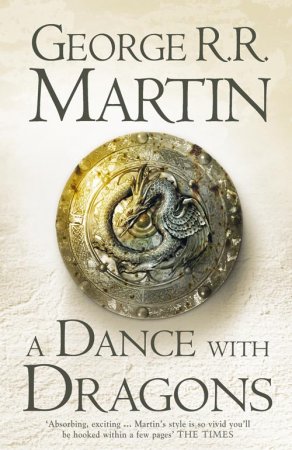 A Dance with Dragons
A Dance with Dragons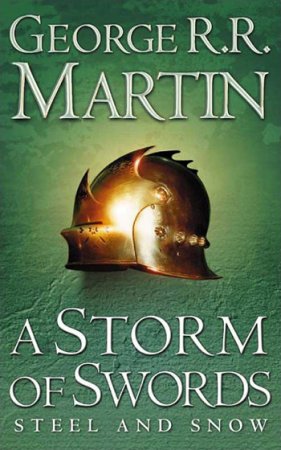 A Storm of Swords
A Storm of Swords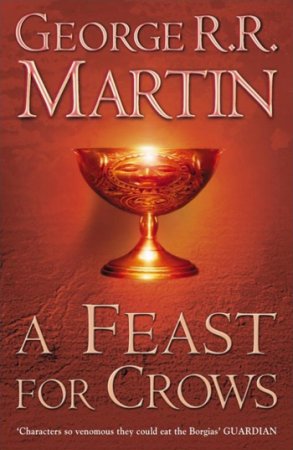 A Feast for Crows
A Feast for Crows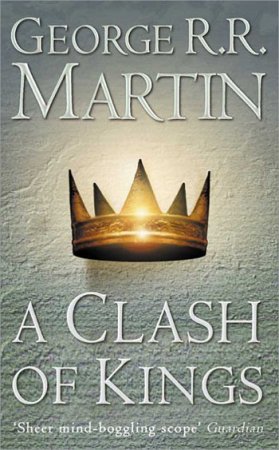 A Clash of Kings
A Clash of Kings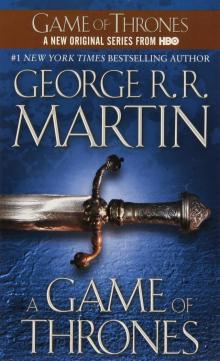 A Game of Thrones
A Game of Thrones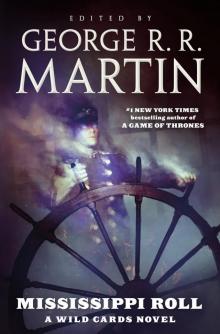 Mississippi Roll
Mississippi Roll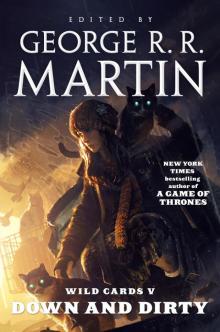 Wild Cards V: Down and Dirty
Wild Cards V: Down and Dirty Busted Flush
Busted Flush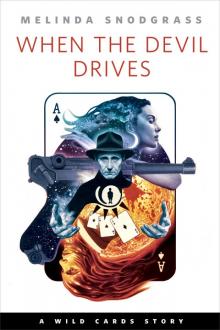 When the Devil Drives
When the Devil Drives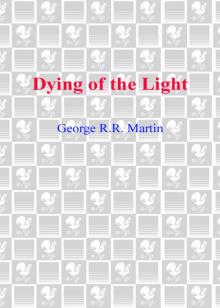 Dying of the Light
Dying of the Light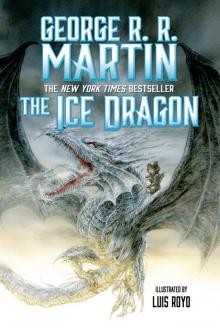 The Ice Dragon
The Ice Dragon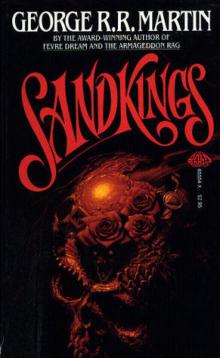 Sandkings
Sandkings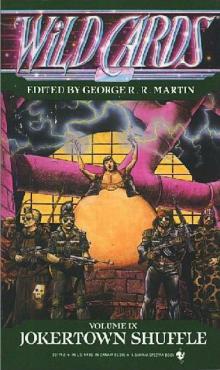 Jokertown Shuffle
Jokertown Shuffle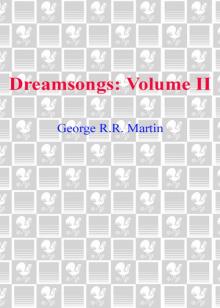 Dreamsongs. Volume II
Dreamsongs. Volume II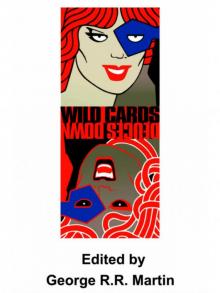 Deuces Down
Deuces Down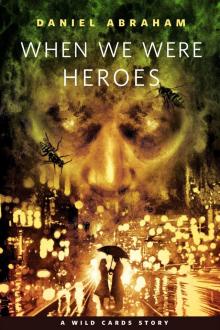 When We Were Heroes
When We Were Heroes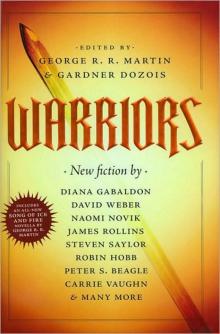 Warriors
Warriors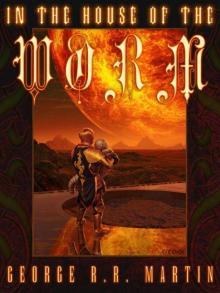 In the House of the Worm
In the House of the Worm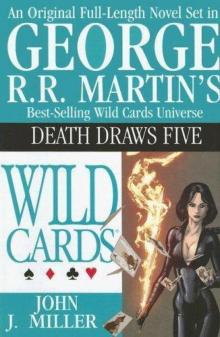 Death Draws Five
Death Draws Five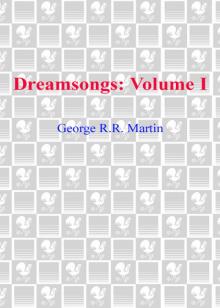 Dreamsongs. Volume I
Dreamsongs. Volume I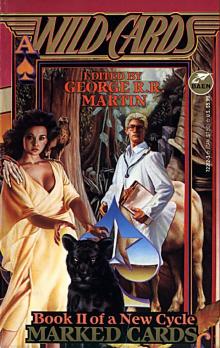 Marked Cards
Marked Cards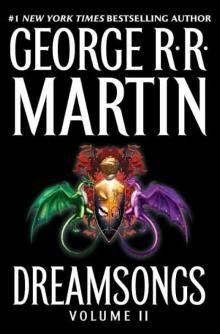 Dreamsongs
Dreamsongs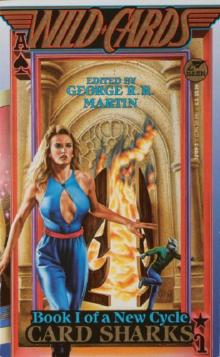 Card Sharks
Card Sharks Dangerous Women
Dangerous Women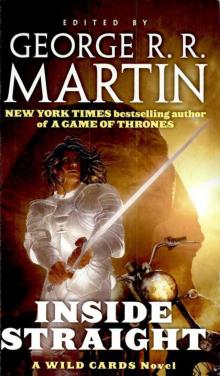 Inside Straight
Inside Straight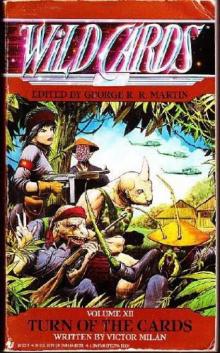 Turn of the Cards
Turn of the Cards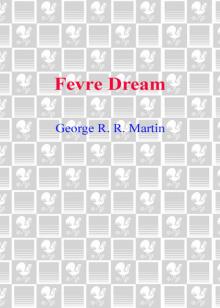 Fevre Dream
Fevre Dream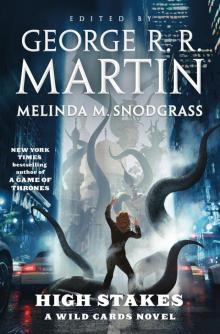 High Stakes: A Wild Cards Novel
High Stakes: A Wild Cards Novel Windhaven
Windhaven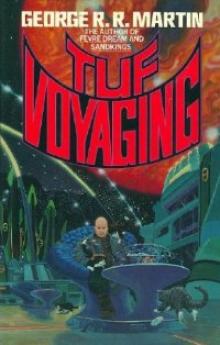 Tuf Voyaging
Tuf Voyaging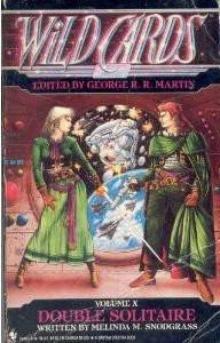 Double Solitaire
Double Solitaire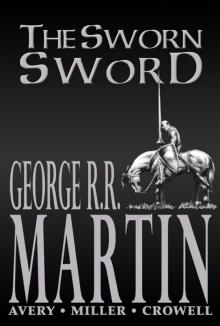 The Sworn Sword
The Sworn Sword Low Chicago
Low Chicago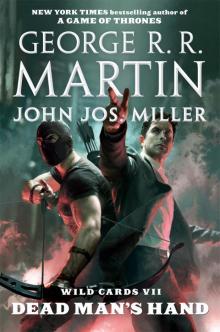 Dead Man's Hand
Dead Man's Hand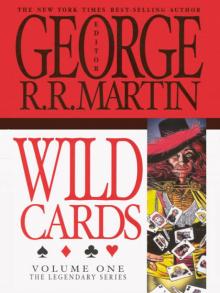 Wild Cards
Wild Cards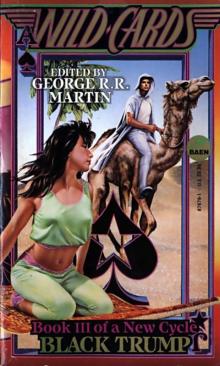 Black Trump
Black Trump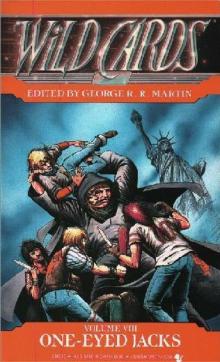 One Eyed Jacks
One Eyed Jacks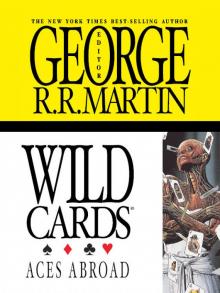 Wild Cards: Aces Abroad
Wild Cards: Aces Abroad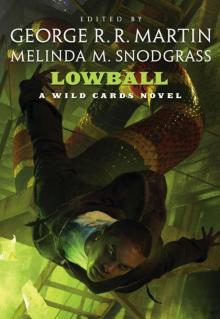 Lowball: A Wild Cards Novel
Lowball: A Wild Cards Novel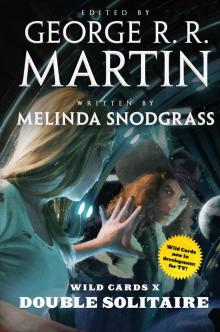 Double Solitaire (2019 Edition)
Double Solitaire (2019 Edition)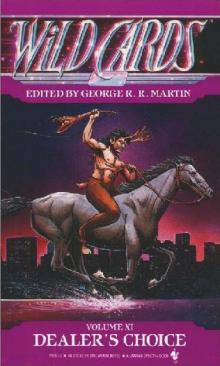 Dealer's Choice
Dealer's Choice Ace in the Hole
Ace in the Hole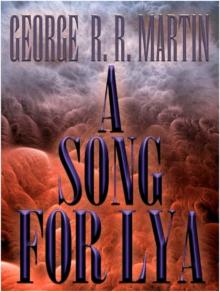 A Song for Lya: And Other Stories
A Song for Lya: And Other Stories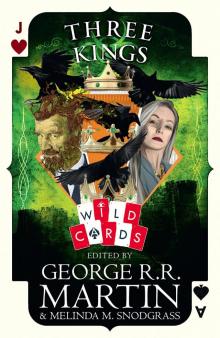 Three Kings
Three Kings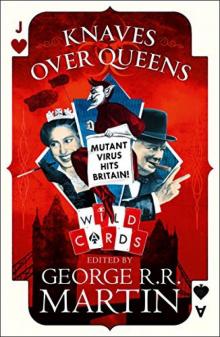 Knaves Over Queens
Knaves Over Queens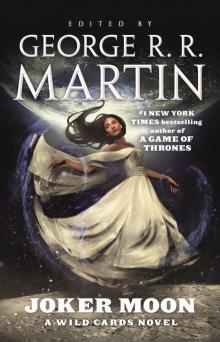 Joker Moon
Joker Moon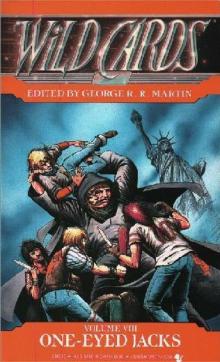 One Eyed Jacks wc-8
One Eyed Jacks wc-8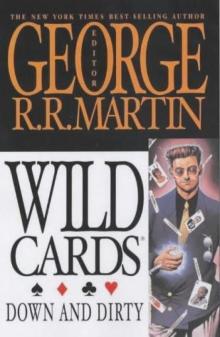 Down And Dirty wc-5
Down And Dirty wc-5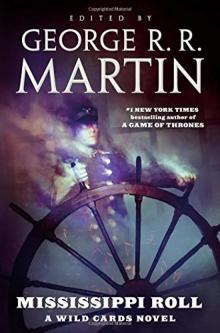 Mississippi Roll_A Wild Cards Novel
Mississippi Roll_A Wild Cards Novel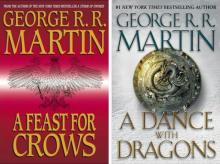 A Feast for Dragons
A Feast for Dragons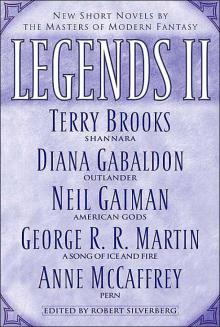 The Sworn Sword ttodae-2
The Sworn Sword ttodae-2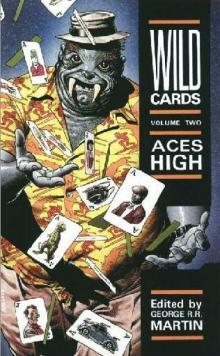 Aces High wc-2
Aces High wc-2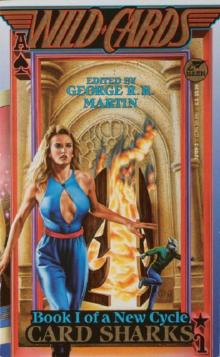 Wild Cards 13 : Card Sharks
Wild Cards 13 : Card Sharks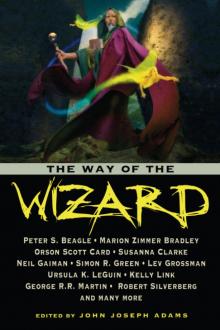 Way of the Wizard
Way of the Wizard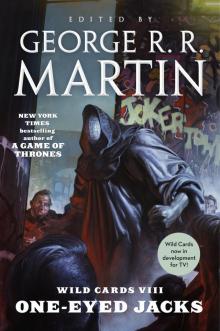 Wild Cards VIII: One-Eyed Jacks
Wild Cards VIII: One-Eyed Jacks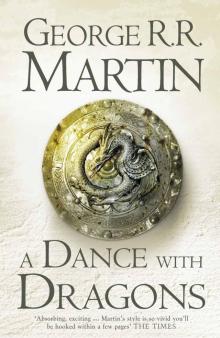 A Dance With Dragons: Book 5 of A Song of Ice and Fire (Song of Ice & Fire 5)
A Dance With Dragons: Book 5 of A Song of Ice and Fire (Song of Ice & Fire 5)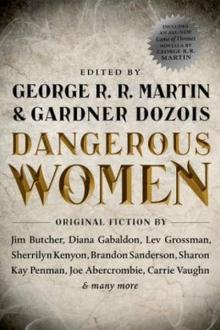 The Princess and The Queen, Or, The Blacks and The Greens (a song of ice and fire)
The Princess and The Queen, Or, The Blacks and The Greens (a song of ice and fire)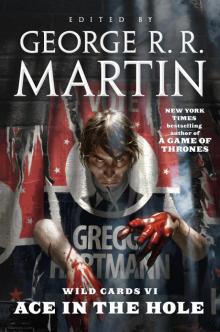 Wild Cards VI--Ace in the Hole
Wild Cards VI--Ace in the Hole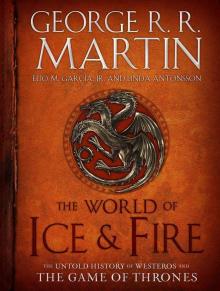 The World of Ice & Fire: The Untold History of Westeros and the Game of Thrones (A Song of Ice and Fire)
The World of Ice & Fire: The Untold History of Westeros and the Game of Thrones (A Song of Ice and Fire)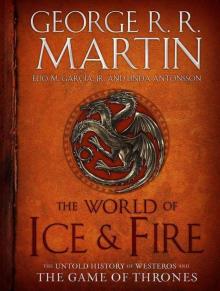 The World of Ice & Fire: The Untold History of Westeros and the Game of Thrones
The World of Ice & Fire: The Untold History of Westeros and the Game of Thrones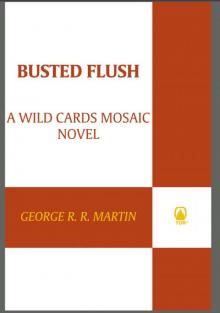 Busted Flush wc-19
Busted Flush wc-19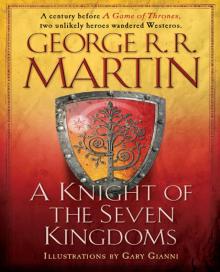 A Knight of the Seven Kingdoms
A Knight of the Seven Kingdoms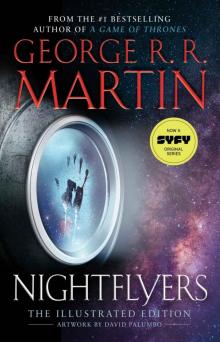 Nightflyers: The Illustrated Edition
Nightflyers: The Illustrated Edition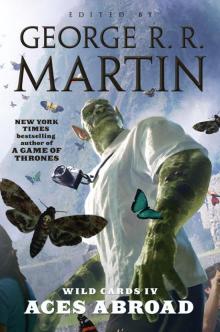 Wild Cards IV
Wild Cards IV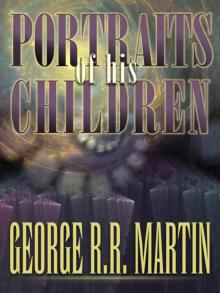 Portraits of His Children
Portraits of His Children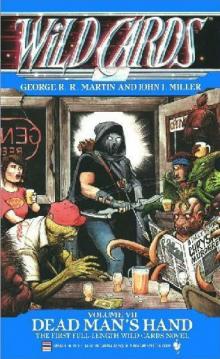 Dead Mans Hand wc-7
Dead Mans Hand wc-7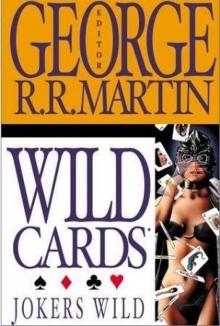 Jokers Wild wc-3
Jokers Wild wc-3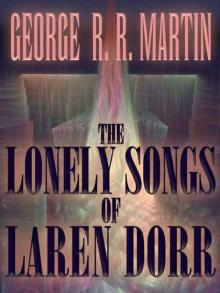 The Lonely Songs of Laren Dorr
The Lonely Songs of Laren Dorr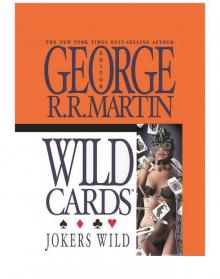 Wild Cards III: Jokers Wild
Wild Cards III: Jokers Wild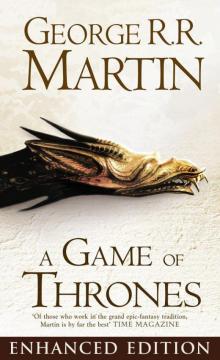 A Game of Thrones Enhanced Edition
A Game of Thrones Enhanced Edition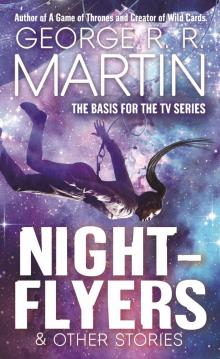 Nightflyers & Other Stories
Nightflyers & Other Stories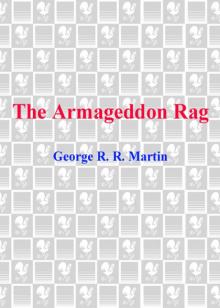 Armageddon Rag
Armageddon Rag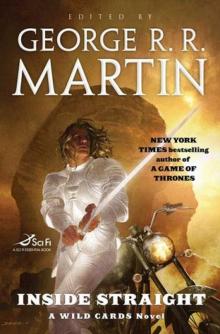 Wild Cards: Inside Straight
Wild Cards: Inside Straight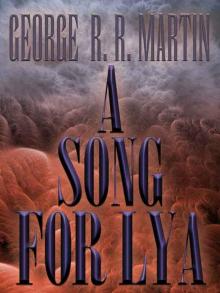 A Song for Lya
A Song for Lya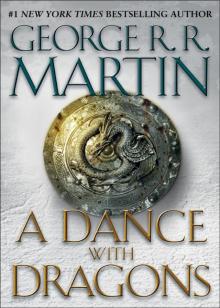 A Dance with Dragons: A Song of Ice and Fire: Book Five
A Dance with Dragons: A Song of Ice and Fire: Book Five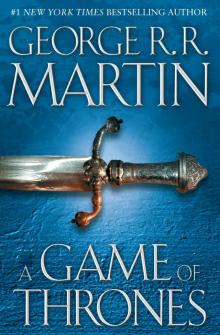 Song of Fire & Ice 01 - A Game of Thrones
Song of Fire & Ice 01 - A Game of Thrones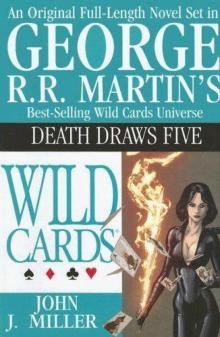 Death Draws Five wc-17
Death Draws Five wc-17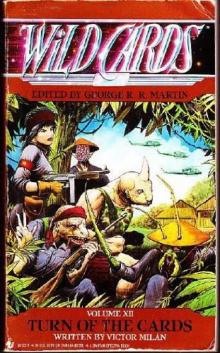 Turn of the Cards w-12
Turn of the Cards w-12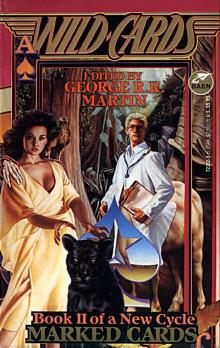 Wild Cards 14 - Marked Cards
Wild Cards 14 - Marked Cards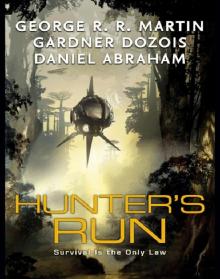 Hunter's Run
Hunter's Run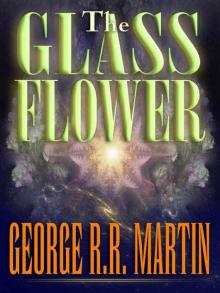 The Glass Flower
The Glass Flower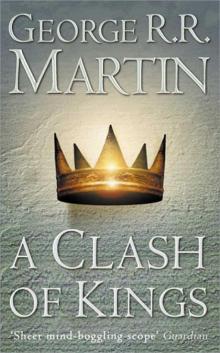 A Clash of Kings asoiaf-2
A Clash of Kings asoiaf-2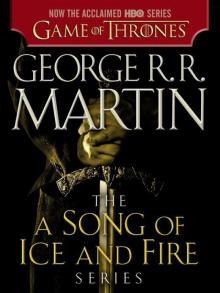 A Game of Thrones 5-Book Bundle: A Song of Ice and Fire Series: A Game of Thrones, A Clash of Kings, A Storm of Swords, A Feast for Crows, and A Dance with Dragons (Song of Ice & Fire)
A Game of Thrones 5-Book Bundle: A Song of Ice and Fire Series: A Game of Thrones, A Clash of Kings, A Storm of Swords, A Feast for Crows, and A Dance with Dragons (Song of Ice & Fire)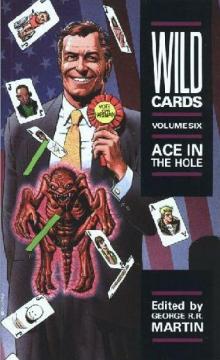 Ace In The Hole wc-6
Ace In The Hole wc-6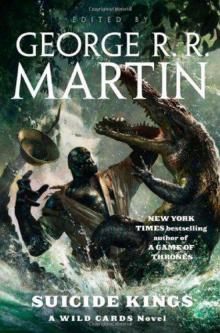 Suicide Kings wc-20
Suicide Kings wc-20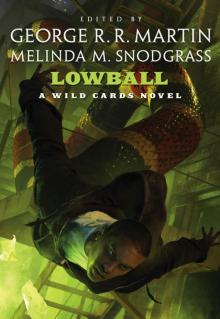 Lowball
Lowball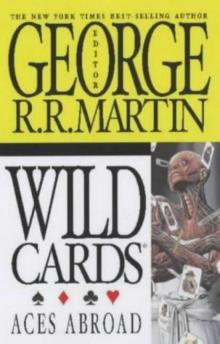 Aces Abroad wc-4
Aces Abroad wc-4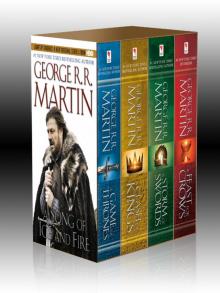 George R. R. Martin's a Game of Thrones 4-Book Bundle
George R. R. Martin's a Game of Thrones 4-Book Bundle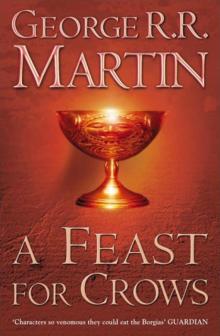 A Feast for Crows asoiaf-4
A Feast for Crows asoiaf-4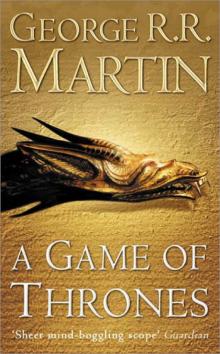 A Game of Thrones asoiaf-1
A Game of Thrones asoiaf-1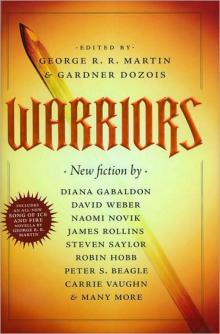 The Mystery Knight ttodae-3
The Mystery Knight ttodae-3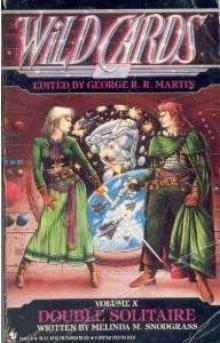 Double Solitaire w-10
Double Solitaire w-10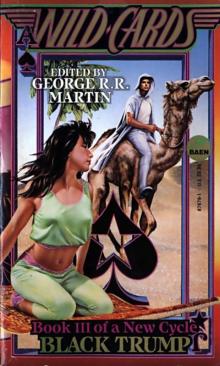 Wild Cards 15 - Black Trump
Wild Cards 15 - Black Trump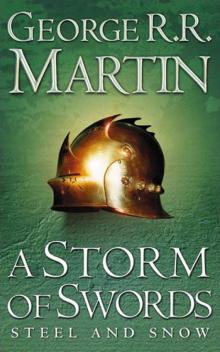 A Storm of Swords asoiaf-3
A Storm of Swords asoiaf-3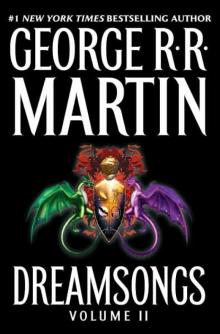 The Hedge Knight ttodae-1
The Hedge Knight ttodae-1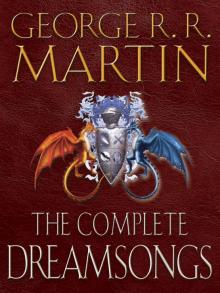 Dreamsongs 2-Book Bundle
Dreamsongs 2-Book Bundle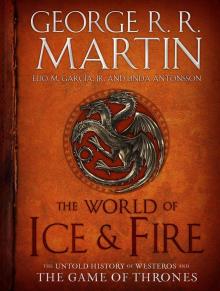 The World of Ice & Fire
The World of Ice & Fire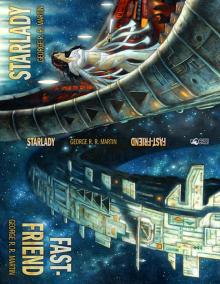 Starlady & Fast-Friend
Starlady & Fast-Friend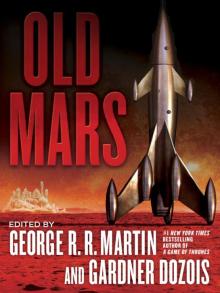 Old Mars
Old Mars Fantasy For Good: A Charitable Anthology
Fantasy For Good: A Charitable Anthology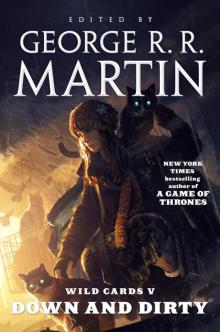 Wild Cards V
Wild Cards V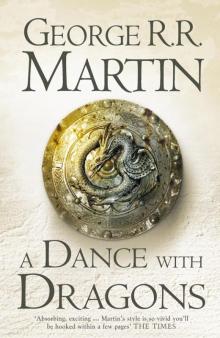 A Dance with Dragons asoiaf-5
A Dance with Dragons asoiaf-5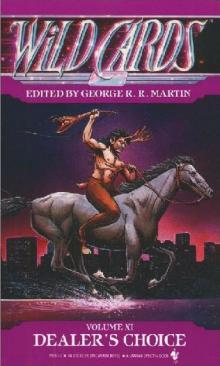 Dealer's Choice w-11
Dealer's Choice w-11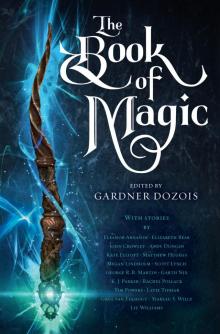 The Book of Magic
The Book of Magic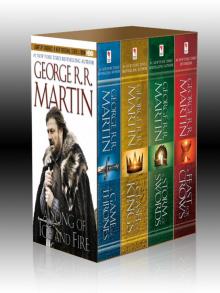 A Game of Thrones 4-Book Bundle
A Game of Thrones 4-Book Bundle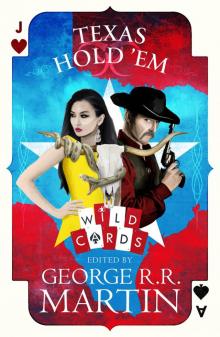 Texas Hold 'Em
Texas Hold 'Em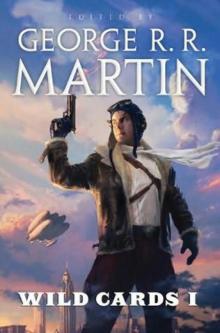 Wildcards wc-1
Wildcards wc-1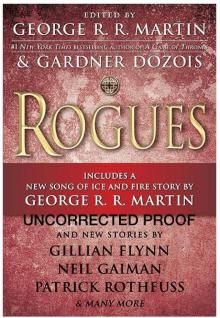 Rogues
Rogues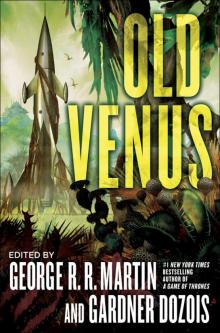 Old Venus
Old Venus